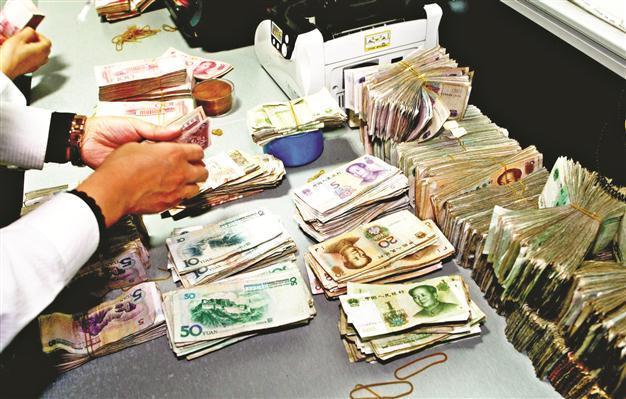China challenges US on manipulation accusation
WASHINGTON / SHANGHAI

A clerk counting stacks of Chinese notes at a bank in Suining, southwest China. The US blames the Chinese government for keeping the value of yuan intentionally low. AFP photo
China’s state news agency urged yesterday the United States to put an end a “meaningless quarrel” over its yuan currency, a day after Washington declined to name Beijing a currency manipulator.
The U.S. Treasury said on Dec. 27 that China’s yuan is still significantly undervalued, although it
refrained from saying Beijing manipulates the currency, which could lead to retaliatory action by
Congress.
China’s official Xinhua news agency praised the U.S. Treasury decision in a commentary, saying
it sent a “positive signal” that would soothe financial markets and promote trade.
“It is time to move beyond the useless, meaningless quarrel over the exchange rate and look to the broader picture and new areas for both bilateral and global trade cooperation,” it said.
U.S. officials have long accused China of keeping its currency artificially low, fuelling a flow of cheap exports that helped send the US trade deficit with China to more than $270 billion in 2010.
But China defends its exchange rate regime, saying it is moving gradually to make the yuan more flexible.
Yuan “exchange rate reform and the internationalization of the [yuan] will be a gradual and long-term process,” the commentary said.
“Pushing for a sharp rise or decline in the exchange rate or seeking a once-for-all solution would be both unrealistic and harmful.”
The U.S. Treasury said the yuan had risen 7.5 percent against the dollar in the 18 months since Beijing began allowing a managed appreciation, and by 12 percent if China’s high inflation rate is figured in.
Nevertheless, it said the level of appreciation was “insufficient” and more progress was needed.
The United States also chided Japan for stepping into the Currency market to stem the yen’s rise, and urged South Korea to use such interventions sparingly.
The U.S. Treasury, in a semi-annual report, criticized Tokyo for its solo yen-selling interventions in August and October that followed a joint Group of 7 action in the aftermath of the March 11 earthquake.
“The unilateral Japanese interventions were undertaken when exchange market conditions appeared to be operating in an orderly manner and volatility in the yen-dollar exchange rate was lower than, for example, the euro-dollar market,” the report said.
“In contrast to the post-earthquake joint G7 intervention in March, the United States did not support these interventions,” the Treasury said, adding that Tokyo should pursue reforms to revive its domestic economy rather than try to influence the exchange rate.
A senior Japanese government official told Reuters that the report did not change Tokyo’s position that its currency policy was in line with G7 agreements.
“This report does not make it more difficult for Japan to intervene,” said the official, who spoke on condition of anonymity due to the sensitivity of the topic. “We are committed to doing whatever is necessary.”
